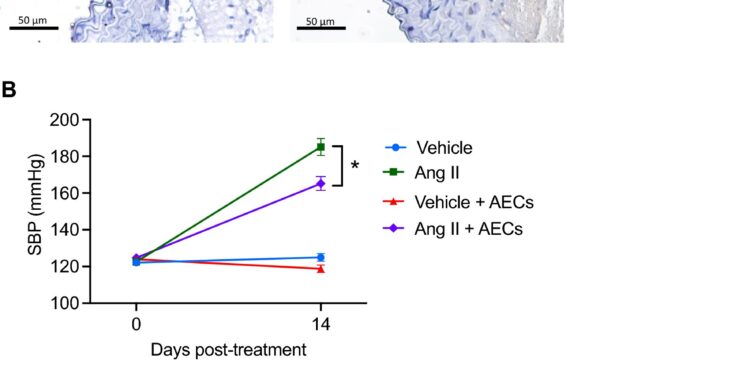Angiotensin II-induced hypertension and aortic stiffening are reduced by administration of amniotic epithelial cells. (A) Immunostaining for HLA-G in angiotensin II and angiotensin II + amniotic epithelial cell (AEC)-treated mice. (B) Effect of amniotic epithelial cells (AEC) on angiotensin II-induced hypertension (n = 8–11). (C) Effect of angiotensin II infusion and co-treatment with AECs on pulse wave velocity (n = 6–7). (D) Delta change (days 0 and 14) in pulse wave velocity (n = 6–7). Credit: Scientific reports (2024). DOI: 10.1038/s41598-024-52214-0
Scientists from La Trobe University and the Hudson Institute have demonstrated that placental cells could have therapeutic benefits for patients with high blood pressure.
The research, led by Professor Michael De Silva, La Trobe lecturer in physiology and pharmacology, and published in Scientific reportshas advanced La Trobe’s recent studies on the use of placental cells for stroke recovery and has successfully passed human safety trials.
In the next phase, this new therapy will be evaluated for its effectiveness in reducing brain damage caused by stroke, pending approval from the Therapeutic Goods Administration.
“Here, we built on the groundbreaking results of La Trobe’s previous studies using these cells in models of stroke,” said Dr. De Silva. “If infused within a day of a stroke, the cells target the affected area of the brain and reduce inflammation and nerve cell death.”
“We realized we could test whether similar protection could be seen in reducing the damage caused by high blood pressure in the body and found that the treatment reduced inflammation in blood vessels,” said Dr De Silva.
High blood pressure, also known as hypertension, is the leading cause of strokes and heart attacks and, over time, creates inflammation in the arteries and can lead to vascular dementia. More than one in three Australians aged over 18 have high blood pressure.
The La Trobe research team led by Dr Michael De Silva, Dr Quynh Nhu Dinh and Professor Chris Sobey found that cells collected by the Hudson Institute from placentas donated by mothers after caesarean section reduced the inflammation and prevented cognitive disorders.
“Blood pressure control rates are at an alarming 32% in Australia. Even if a drug can reduce high blood pressure, these cells could target the inflammation in the arteries caused by hypertension and therefore reduce the risks associated with cardiovascular disease and cognitive impairment,” said Dr. De Silva.
Dr De Silva said that although the research was in its early stages and the team would continue to work on how this knowledge could benefit patients with high blood pressure, he was pleased to see that this research could eventually lead to a new form of therapy that reduces damage to blood vessels and the brain when blood pressure is high.
More information:
Quynh Nhu Dinh et al, Human amnion epithelial cell therapy reduces hypertension-induced vascular stiffening and cognitive impairment, Scientific reports (2024). DOI: 10.1038/s41598-024-52214-0
Provided by La Trobe University
Quote: Placental cells can lower blood pressure (January 31, 2024) retrieved January 31, 2024 from
This document is subject to copyright. Except for fair use for private study or research purposes, no part may be reproduced without written permission. The content is provided for information only.



